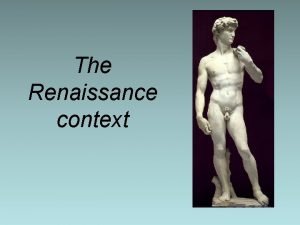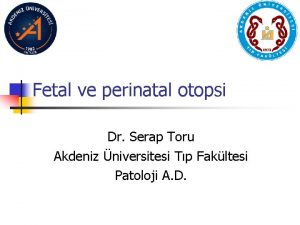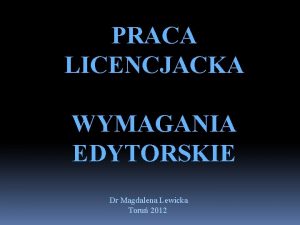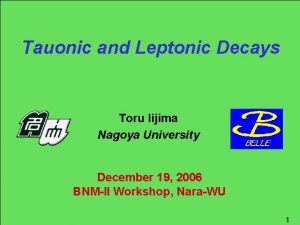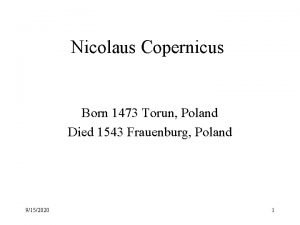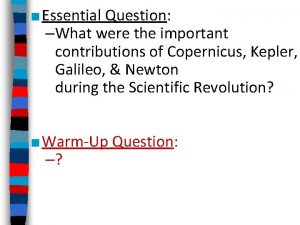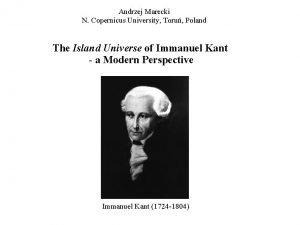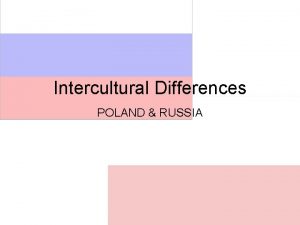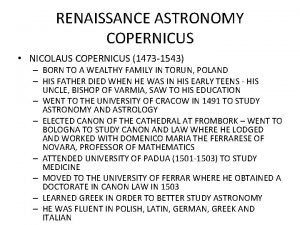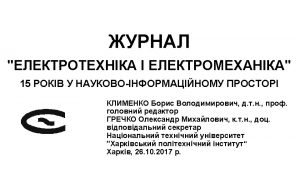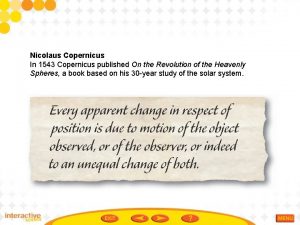Aleksandra Walkiewicz Nicolas Copernicus University Toru Poland The

























- Slides: 25

Aleksandra Walkiewicz Nicolas Copernicus University, Toruń, Poland The MIC Theory As Tertium Comparationis in the Contrastive Study of Verbal Aspect in Polish and French

Polish as a “unique” and “neglected” language Advantages of the MIC theory: ü despite some superficial differences, the meanings expressed using aspect forms in Polish may, to a certain extent, be expressed with other means in other languages; ü meta-language, terminology and methods applied within the MIC theory enable describing semantic and pragmatic phenomena of the Polish language in comparison to other Slavic and non-Slavic languages.

Some key problems in teaching Polish verbal aspect to foreigners • difficulties in applying theory of aspect to the teaching process • difficulties in creating single choice exercises • many important and practical uses of the imperfective are never mentioned or explained in grammar or student books

Difficulties in creating single choice questions 1. Po południu ona (robić / zrobić) duże zakupy. 2. W sobotę ja (oglądać / obejrzeć) interesujący film w telewizji. (J. Ciechorska, Ludzie, czas, miejsca, s. 173) 3. Podczas studiów spotykałem się / spotkałem się z moją przyszłą żoną. 4. Poznawałem / poznałem moją przyszłą żonę podczas studiów. 5. Między 12 a 13 pisałam / napisałam listy i słuchałam muzyki. (A. Burkat, A. Jasińska, Hurra! Po polsku 2, s. 26)

The so-called “untypical” uses of the imperfective 6. Nie czytałem „Pana Tadeusza”. ‘I haven’t read ”Pan Tadeusz” ‘. 7. Jadłaś ostrygi? ‘Have you eaten / had oysters? ’ 8. Ale tu zimno, otwierałaś okno? ‘It is so cold in here, was the window open? ’ 9. Masz czerwone oczy, płakałaś? ‘Your eyes are red, have you been crying? ’ 10. Piękny portfel. – Sam wybierałem! ‘What a beautiful wallet. – I chose it myself!’ 11. Marysia brała samochód i takie są skutki. ‘Mary has taken the car and these are the results. ’

12. Pani profesor wspominała wczoraj o tym problemie. ‘The professor mentioned this problem yesterday. ’ 13. Proszę opowiedzieć, jak zabił pan milicjanta. – Żadnego milicjanta nie zabijałem! ‘Please, tell us how you killed the policeman. – I did not kill any policeman!’ 14. Mieszkałam w Paryżu od 2009 do 2010 roku. ‘I lived in Paris from 2009 to 2010. ’

(1) Difficulties in applying theory of aspect to the teaching process (2) Difficulties in creating single choice exercises (3) Many important and practical uses of the imperfective are never mentioned or explained Implicit / explicit assumptions: • imperfective and perfective forms are opposed as to their semantic values (both members of the opposition are marked), • using the imperfective in contexts „reserved” for the perfective (one-time, completed actions) is interpreted as “untypical” and “paradoxical”. In such contexts, the imperfective could be replaced by the perfective.

Aspect forms enter in opposition: perfective imperfective one-time actions multiple, repetitive actions completed, terminated actions incomplete actions still in progress we concentrate on the result we are interested in the action itself

The so-called “untypical” uses of the imperfective 6. Nie czytałem „Pana Tadeusza”. ‘I haven’t read „Pan Tadeusz” ‘. 7. Jadłaś ostrygi? ‘Have you eaten / had oysters? ’ 8. Ale tu zimno, otwierałaś okno? ‘It is so cold in here, was the window open? ’ 9. Masz czerwone oczy, płakałaś? ‘Your eyes are red, have you been crying? ’ 10. Piękny portfel. – Sam wybierałem! ‘What a beautiful wallet. – I chose it myself!’ 11. Marysia brała samochód i takie są skutki. ‘Mary has been taking the car and these are the results. ’

Nie czytałem „Pana Tadeusza”. ‘I haven’t read ”Pan Tadeusz”. ‘ Nie przeczytałem „Pana Tadeusza”. ‘I didn’t read ”Pan Tadeusz”. ‘ Jadłaś ostrygi? ‘Have you eaten oysters? ’ Zjadłaś ostrygi? ‘Did you eat the oysters? ’ Ale tu zimno, otwierałaś okno? ‘It is cold in here, was the window open? ’ Ale tu zimno, otworzyłaś okno? ‘It is cold in here, did you open the window? ’

Semantic and pragmatic approaches to the problem: • • Stanisław Karolak (1997, 2008) Ewa Ciszewska Małgorzata Nowakowska, Denis Apothéloz (2008) Hélène & André Włodarczyk (1997 -)

General assumptions: • the perfective and imperfective aspect enter in a privative opposition, • while describing aspect uses, it is necessary to take into consideration some important pragmatic factors (Old vs. New, anaphoric and cataphoric meanings).

Aspect as a privative opposition (A. & H. Włodarczyk) perfective imperfective marked member (limit, result. . . ) non-marked member the use of the imperfective allows the speaker to avoid or refrain from expressing some meanings carried by the perfective

“Avoiding” the result meaning 14. Zdawałem ten egzamin w piątek. 15. Zdałem ten egzamin w piątek. 16. Anna czekała na Piotra do 2. 00. 17. Anna zaczekała na Piotra do 2. 00. 18. Zrób to! Nie rób tego! 19. Chciałbym wyjechać za granicę. 20. Nie chciałbym wyjeżdżać za granicę. 21. Proszę opowiedzieć, jak zabił pan milicjanta. – Żadnego milicjanta nie zabijałem!

A special case: verbs indicating states (durative verbs, etc. ) 22. Mieszkałem w Paryżu od 2009 do 2010 r. ‘I lived in Paris from 2009 til 2010 / J’ai habité à Paris de 2009 à 2010. ’ 23. Wojna trwała 10 lat. ‘The war lasted for 10 years / La guerre a duré / dura 10 ans. ’ 24. Król rządził do zeszłego roku. ‘The king reigned until last year. / Le roi régna/a régné jusqu’à l’année dernière. ’ 25. Siedział w więzieniu do wtorku. ‘He was in prison until Tuesday. / Il a été en prison jusqu’à mardi. ’

“Semantic Result” vs. “Pragmatic Result” (M. Nowakowska) 26. Ale tu zimno, otwierałeś okno? ‘It is so cold in here, was the window open? 27. Piękna portmonetka. – Sam wybierałem! ‘What a beautiful wallet. – I chose it myself!’ 28. Kto pisał ten tekst? Same bzdury! ‘Who wrote this text? Pure nonsense!’ 29. Marysia brała samochód i takie są skutki. ‘Mary has been taking the car and these are the results. ’

A. & H. Włodarczyk, The MIC theory Information Type of storage grounding Intermediate memory Permanent memory OLD Status NEW Status Communication Anaphoric Cataphoric Beliefs (epistemic) Known Unknown Ontology (referential) Generic Specific General Particular Potential Actual Habitual Occasional

Znaczenia motywowane przez ontologię OLD generic Dinozaury jadły głównie liście drzew i małe owoce leśne. Woda wrze w 100 c. NEW specific Dinozaury zjadły głównie liście drzew i małe owoce leśne. Woda zawrzała. general Polski żołnierz umiera z honorem. Egipcjanie balsamowali ciała. particular Polski żołnierz umarł z honorem. Egipcjanie zabalsamowali ciała. potential Janek dobrze pisał, świetnie się zapowiadał. actual Janek dobrze napisał test. habitual W piątki chodziliśmy na basen. occasional W piątek poszliśmy na basen.

General meaning: kementów danej klasy • so-called parfait d’existence (M. Nowakowska) 30. Jadłeś (kiedyś) ślimaki? ‘Have you ever had snails? ’ 31. Nie zdawałem jeszcze egzaminu z gramatyki. ‘I haven’t taken the grammar exam yet. ’ 32. Nie czytałem „Pana Tadeusza”. ‘I haven’t read Pan Tadeusz’ ‘During the period limited to the right by the moment of speaking the subject s has (not) experienced the situation S’

Have you (ever) eaten snails? / Have you had snails before? Est-ce que tu as (jamais, déjà) mangé des escargots? I haven’t taken the grammar exam yet. Je n’ai pas encore subi l’examen de grammaire.

A. & H. Włodarczyk, The MIC theory Information Type of storage grounding Intermediate memory Permanent memory OLD status NEW status Communication anaphoric cataphoric Beliefs (epistemic) known unknown Ontology (referential) generic specific general particular potential actual habitual occasional

A “known” situation Czy panowie już zamawiali? (M. Nowakowska) ‘Have you ordered? ’ A & H. Włodarczyk: it is an old, known situation (both the speaker and the interlocutor are familiar with the typical restaurant scenario). M. Nowakowska: parfait d’existence de scénario. Ola: Cem, dlaczego nie masz zadania domowego? Cem: Przeprowadziłem się. Ola: Nie – przeprowadzałem się.

Anaphoric Nosiłeś tego dnia sweter z czerwonej puszystej wełny. „To był piękny sweter”, dodałeś, „z angory. Po bardzo bogatym Żydzie. . . ”. Na nim były dwa skórzane pasy na krzyż, a pośrodku – na piersi – latarka. „Słuchaj, jak ja wyglądałem!” mówiłeś mi, kiedy zapytałam o dzień dziewiętnasty kwietnia. . . -Tak mówiłem? (H. Krall, Zdążyć przed Panem Bogiem, 5) Zamknij drzwi! Zamykaj, bo jest przeciąg! ‘Close the door! Come on, close it, it is chilly!’

The imperfective aspect is the non-marked member of the aspect opposition, used when: • we want to avoid expressing one of the meanings carried out by the perfective (result, ingression, interruption. . . ); • it is not necessary to express the result meaning, as we are in a known- or anaphoric-type situation.

Thank you for your attention!
 Aleksandra walkiewicz
Aleksandra walkiewicz Nicolas copernicus
Nicolas copernicus Taş bebek yüzü von gierke
Taş bebek yüzü von gierke Sisendlogistika
Sisendlogistika Katarzyna lewicka
Katarzyna lewicka Serap toru
Serap toru Toru dutt
Toru dutt Kranioşizis
Kranioşizis Toru sakaguchi
Toru sakaguchi Toru�� praca
Toru�� praca Powersum acr
Powersum acr Dərəcə toru
Dərəcə toru Toru iijima
Toru iijima Search image text
Search image text Copernican revolution summary
Copernican revolution summary Poland
Poland Copernicus
Copernicus Copernicus online data access
Copernicus online data access Where was nicolaus copernicus born
Where was nicolaus copernicus born Copernicus institute of sustainable development
Copernicus institute of sustainable development Copernicus
Copernicus Johannes kepler theory
Johannes kepler theory Copernicus sentinel
Copernicus sentinel Copernicus
Copernicus Copernicus global land service
Copernicus global land service Copernicus
Copernicus

